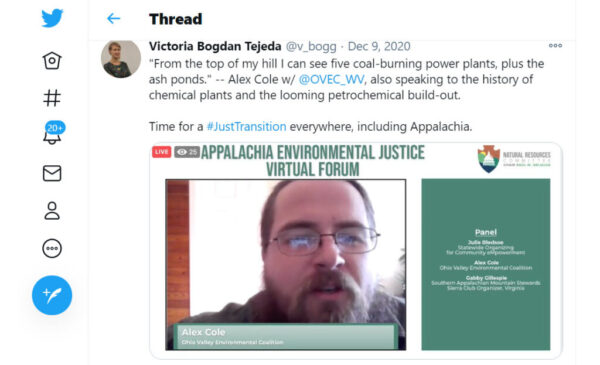
People could of course attend live, but ICYMI (in case you missed it), you can watch the one-hour forum here.
The citizen-panelists spoke to the effects industrial pollution and mountaintop-removal
coal mining have on residents of our region. The panelists were Julie Bledsoe with Statewide Organizing for Community eMpowerment, Gabby Gillespie with the Southern Appalachian Mountain Stewards and Sierra Club Virginia, and OVEC organizer Alex Cole, who shows up around 22 minutes into the forum.
This event was the latest “stop” of the committee’s Environmental Justice Now Tour, which is
serving to underscore the urgent need for passage of the House Environmental Justice for All Act.
Last year, then Vice President-elect Sen. Kamala Harris introduced a companion bill in the Senate.
As E & E News coverage of the event reports, “One provision of the bill would require fossil fuel companies to provide economic aid to communities transitioning from coal, oil and gas.”
In an article titled Environmental Justice Now Tour – A Just Transition in Appalachia the Environmental and Energy Study Institute reported:
The Environmental Justice Now Tour’s panelists opening statements described their own experiences with the impacts of pollution in the region, observing increases in respiratory diseases and contamination of their lands. Julie Bledsoe, of Statewide Organizing for Community eMpowerment, described the health challenges her husband has been facing; He was denied protective equipment while working to clean up the Kingston coal ash spill and now struggles from Chronic Obstructive Pulmonary Disease (COPD). Similarly, Alex Cole of the Ohio Valley Environmental Coalition, described the contamination in the Kanawha river valley. The river’s sediments have toxic concentrations of PCB and dioxins and the water is unusable to the municipalities who reside alongside it.
Recognizing the harm that has been done in the region, the hearing looked to the future and addressed how policymakers could better serve the communities in Appalachia. The panelists emphasized the need to create multiple, meaningful solutions that incorporate local voices and span research, education, policy, and economic development.
Here here, hear our voices!









